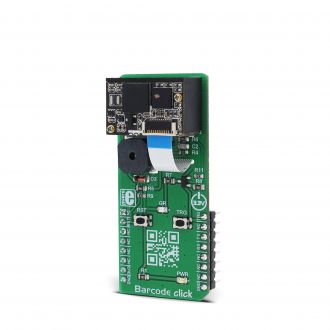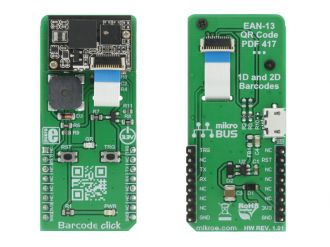
We strongly encourage users to use Package manager for sharing their code on Libstock website, because it boosts your efficiency and leaves the end user with no room for error. [more info]

Rating:
Author: MIKROE
Last Updated: 2018-03-30
Package Version: 1.0.0.0
mikroSDK Library: 1.0.0.0
Category: Miscellaneous
Downloaded: 5010 times
Not followed.
License: MIT license
Barcode click is a very fast and agile barcode scanner on a click board, which is compliant with a wide range of different 1D and 2D barcode protocols.
Do you want to subscribe in order to receive notifications regarding "Barcode click" changes.
Do you want to unsubscribe in order to stop receiving notifications regarding "Barcode click" changes.
Do you want to report abuse regarding "Barcode click".


Library description
Initializes and defines UART and GPIO drivers. It also defines driver functions for UART bus communication which enable barcode scanning and barcode scanner restart. Check the documentation for more details.
Key functions:
uint8_t barcode_readyData() - The function checks whether the RX buffer received new data.
uint8_t barcode_readData() - The function reads and returns one byte which is received in the RX buffer.
void barcode_enableScaning(const uint8_t state) - The function enables or disables barcode scanning, depending on the parameter value.
void barcode_enableReset(const uint8_t state) - The function enables or disables barcode scanner reset, depending on the parameter value.
Examples description
void applicationTask()
{
barcode_enableScaning(_BARCODE_LOGIC_ON);
Delay_ms(2000);
barcode_enableScaning(_BARCODE_LOGIC_OFF);
Delay_ms(2000);
}
//UART Interrupt addition function is used for enabling receiving every transived byte.
void RX_ISR() iv IVT_INT_USART3 ics ICS_AUTO
{
if( RXNE_USART3_SR_bit )
{
temp[i++] = USART3_DR;
}
}
Additional notes and information
Depending on the development board you are using, you may need USB UART click, USB UART 2 click or RS232 click to connect to your PC, for development systems with no UART to USB interface available on the board. The terminal available in all MikroElektronika compilers, or any other terminal application of your choice, can be used to read the message.